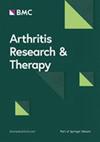Analysis of epigenetic biomarkers for diagnosis and assessment of severity in rheumatoid arthritis: a cross-sectional study
IF 4.6
2区 医学
Q1 Medicine
引用次数: 0
Abstract
Rheumatoid arthritis (RA) is an autoimmune disease influenced by genetic, environmental, and epigenetic factors. Epigenetic modifications, particularly DNA methylation, in immune-related genes may impact inflammation and immune responses. This study aims to analyze methylation patterns in RA patients and controls to identify diagnostic and prognostic epigenetic biomarkers. A cross-sectional study of a prospective cohort comprising 32 patients (16 with severe RA, 16 with nonsevere RA) and 32 healthy controls (discovery cohort) was performed. Severity was defined as a cumulative 28-joint Disease Activity Score with erythrocyte sedimentation rate (DAS28-ESR) ≥ 3.2, positive rheumatoid factor (RF) and anti–citrullinated peptide antibody (ACPA) values, and a high Collinsella aerofaciens count (OTU ≥ 0.15). Whole genome methylation analysis was performed using the Infinium Methylation EPIC BeadChip kit. Subsequently, validation by pyrosequencing (PyroMark Q48) was performed for the differentially methylated positions (DMPs) selected both in the discovery cohort and in the remainder of the inception cohort (78 patients and 78 controls). More than half of the participants were women (≥ 75%), and the mean age was 56 years. At whole genome level, an epigenetic signature was associated with both RA and severity of RA. Pyrosequencing confirmed that methylation levels at CpG sites in TBC1D22A, PRHOXNB, ALLC, and PRG2 genes were associated with RA or severity of RA. The novel association between hypermethylation in TBC1D22A and RA was subsequently confirmed in an independent cohort. Our results indicate that the level of DNA methylation in validated DMPs is associated with RA. Thus, these methylation levels are potential biomarkers for the diagnosis, prognosis and severity of RA.类风湿性关节炎严重程度诊断和评估的表观遗传生物标志物分析:一项横断面研究
类风湿性关节炎(RA)是一种受遗传、环境和表观遗传因素影响的自身免疫性疾病。免疫相关基因的表观遗传修饰,特别是DNA甲基化,可能影响炎症和免疫反应。本研究旨在分析RA患者和对照组的甲基化模式,以确定诊断和预后的表观遗传生物标志物。一项前瞻性队列横断面研究包括32例患者(16例重度RA, 16例非重度RA)和32例健康对照(发现队列)。严重程度定义为累积28个关节疾病活动评分,红细胞沉降率(DAS28-ESR)≥3.2,类风湿因子(RF)和抗瓜氨酸肽抗体(ACPA)阳性,气相collinselella aerofaciens计数高(OTU≥0.15)。使用Infinium methylation EPIC BeadChip试剂盒进行全基因组甲基化分析。随后,通过焦磷酸测序(PyroMark Q48)对发现队列和其余初始队列(78名患者和78名对照)中选择的差异甲基化位点(dmp)进行验证。超过一半的参与者是女性(≥75%),平均年龄为56岁。在全基因组水平上,表观遗传特征与RA和RA的严重程度相关。Pyrosequencing证实,TBC1D22A、PRHOXNB、ALLC和PRG2基因CpG位点的甲基化水平与RA或RA的严重程度相关。TBC1D22A高甲基化与RA之间的新关联随后在一个独立队列中得到证实。我们的研究结果表明,DNA甲基化水平在验证的dmp与RA相关。因此,这些甲基化水平是类风湿关节炎诊断、预后和严重程度的潜在生物标志物。
本文章由计算机程序翻译,如有差异,请以英文原文为准。
求助全文
约1分钟内获得全文
求助全文
来源期刊

Arthritis Research & Therapy
RHEUMATOLOGY-
CiteScore
8.60
自引率
2.00%
发文量
261
审稿时长
14 weeks
期刊介绍:
Established in 1999, Arthritis Research and Therapy is an international, open access, peer-reviewed journal, publishing original articles in the area of musculoskeletal research and therapy as well as, reviews, commentaries and reports. A major focus of the journal is on the immunologic processes leading to inflammation, damage and repair as they relate to autoimmune rheumatic and musculoskeletal conditions, and which inform the translation of this knowledge into advances in clinical care. Original basic, translational and clinical research is considered for publication along with results of early and late phase therapeutic trials, especially as they pertain to the underpinning science that informs clinical observations in interventional studies.
 求助内容:
求助内容: 应助结果提醒方式:
应助结果提醒方式:


